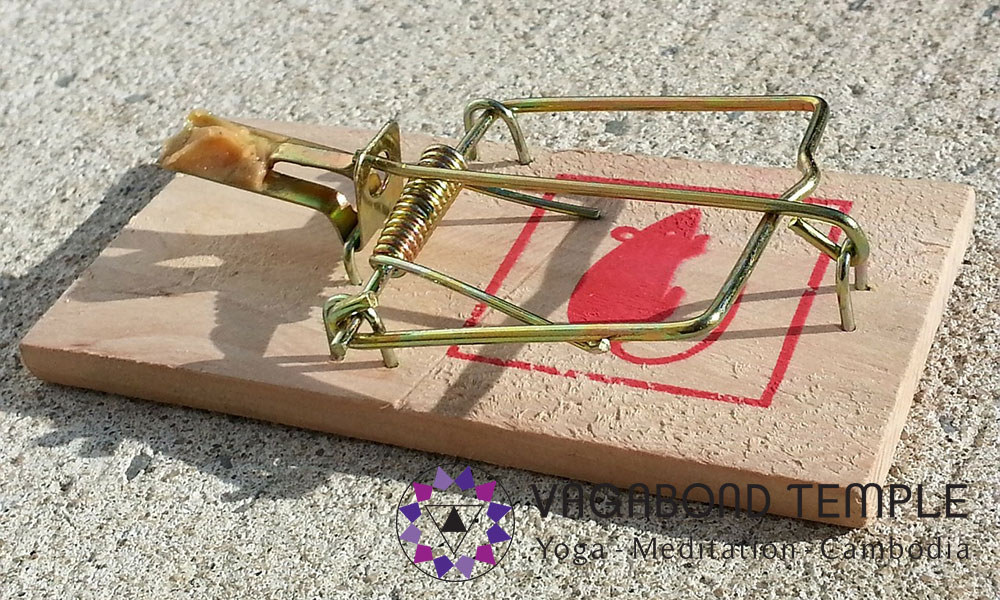Avoiding The Pleasure Trap: Three Ways to Find Genuine Contentment

There is nothing wrong with wanting to be happy, you deserve to be happy! But have you ever wondered why lasting contentment seems so elusive? A new job, a new relationship, a new pair of shoes? Or for the more “spiritually” minded maybe watching a beautiful sunset, a walk in the mountains, or spending time in meditation. All of these experiences can bring happiness, but it is often short-lived: the new job becomes familiar and you start to dream of a promotion, the shoes become dirty and scuffed, the sun goes down, your legs get tired – sooner or later we will be looking for the next thing to make us happy. All of these things are external – and often outside our control; by constantly searching for them we miss out on the feeling of contentment that comes just from being with ourselves in the present moment (the place that all of the spiritual types rave about so much).
How can we move away from this endless pleasure seeking and toward a lasting contentment? It does not require giving up everything you enjoy and going to live in a cave, it is something you can practice right now in your daily life. This article invites you to try out three practices designed to help you find the contentment that comes simply from existing!
1. Wake Up
The first step is to become aware of how the pursuit of pleasure can keep us trapped in a state of discontentment. If you desire something, you are applying the formula:
Me + X = Happy
The X can be anything: a new car, that dream partner, the ability to perform a difficult Yoga pose – it is endless. Obtaining the X will often bring a temporary feeling of happiness, but it will be replaced with another X (when you get that one, then you will REALLY be happy!). What the “M + X” formula does is reinforce the idea that you are incomplete – that there is something lacking. This feeling of incompleteness creates a kind of perpetual restlessness, or in some cases quite profound distress (“If only I had a better body”, “if only I was more confident”, “if only I had studied something different at college”). For that last one you will need to get hold of a time machine, which is unlikely, so the feeling of incompleteness is very hard to shift.
Take some time to reflect on the X’s in your life, write them down, how do they make you feel? Think back to times in your life you managed to the thing you really wanted? Did it bring lasting happiness or did you just find a new X to add to the list? You may be surprised by what you find. As Oscar Wilde said:
“There are only two tragedies in life: one is not getting what one wants, and the other is getting it.”
Realising that pleasure seeking does not bring lasting happiness is not bad news, it is actually quite liberating to see that life does not have to be an endless chase. Dropping the “M + X” attitude and realising you are already complete is not the same as giving up doing enjoyable things to improve your health and well-being, it is quite the opposite. Genuine self-improvement does not come from a guilty sense of not being good enough, it comes from a place of self-love. When you are content and truly appreciate yourself you will naturally do what is best for you, doing it for the sake of doing it rather than for some future payoff. That is what they call living in the moment!
2. Be Grateful
So while endless pleasure seeking fosters a sense of incompleteness, true contentment is a feeling of being complete – where there is no desire to change anything. One way to realise this feeling of completeness is to move the focus from what you do not have to what you already have. In our goal-oriented society it seems gratitude is quite a rarity: how often do you feel thankful for what you have? The things that we really need to survive such as food and shelter are so often taken for granted that it is almost like we forget they exist; spend a few hours lost in a desert and see how grateful you feel when you find some water!
Religion may have got a bad name on account of all the crusading, gilt-tripping and general mind control, but it is not all bad; prayers of gratitude before bed or mealtimes are a common feature of many faiths and are a powerful way to cultivate an attitude of gratitude. If the word “God” for you conjures up a big imaginary, angry man with a beard you can thank the Universe, existence, or just say thanks in general!
Write down a list of five things you are grateful for, it may be challenging because we are so unfamiliar being grateful. If nothing obvious springs to mind then start with the basics like food, shelter, people in your life; try and think of positive things that have happened recently and add them to the list. Doing this before you go to bed every night has a tremendous effect – soon your mind will start to focus on what you have, rather than what you think you need, a much nicer state of mind to be in.
Self-acceptance is another form of gratitude. Many of us get caught up in cycles of self-criticism which bring us back to focusing on what we do not have, or what we need to change. We are only human, we are bound to make mistakes – and lots of them! Understanding this, we can forgive ourselves and accept ourselves no matter how weird we think we are – who wants to be normal anyway?
3. Helping Others
Often we act with a specific end-result in mind: working just for the money, exercising to get a better body, socialising to get some validation, painting to have a nice picture and so on. This is a normal part of being human, but if we only work with a goal in mind are focusing on the future not the present – playing the “M + X = happy” game. If instead we do things for the benefit of others we enter an altogether different state of being, acting without the usual desire for a reward. Cynics will tell you that there is no such thing as an unselfish act, that we do good things just to make ourselves feel good – they are wrong! Good work can be done simply for its own sake.
Helping others can take many forms: doing some volunteering, donating money, getting involved with your local community, creating something that others will enjoy, or simply listening to people – every interaction is an opportunity to give love.
This does not mean you should burn yourself out helping others to the point of exhaustion and not taking care of yourself, this will just create resentment – the opposite of what we are trying to achieve. Taking time to care for yourself and setting boundaries will make you stronger, so giving becomes easier. Helping others will encourage others to follow your lead: right now the world could definitely use a massive injection of loving kindness! It can be a challenge to remain loving when surrounded by people are trapped in unhappy cycle of endless pleasure seeking; one thing that will help a lot is to find some like-minded people who can lend you support, they are out there!
There is a story where a student approaches an enlightened master and asks him how far he needs to go to achieve this transcendent spiritual state. The master replies with a hand gesture: his fore-finger and thumb spread to a distance of about 6 inches. This may seem like the typically cryptic reply you would expect from these enlightened types, but actually the message is simple. It is the distance from the solar-plexus to the heart. The solar-plexus is associated with ego, the heart with compassion – so message is, get your ego acting out of love and you find contentment!
From Happiness To Contentment
By understanding the trap of endless pleasure seeking, practising gratitude, and helping others we can start to make a fundamental change in our attitude to life. Paradoxically we learn to experience something which is not an experience – the present moment. It is not exciting, it is not boring, it is not easy, it is not difficult, it just IS. This is reality: catch a glimpse of it and there is no going back!



